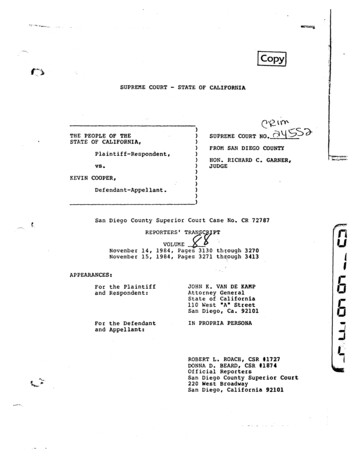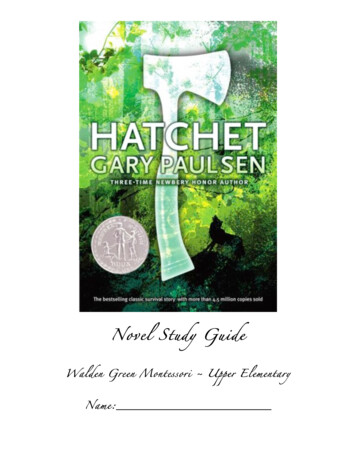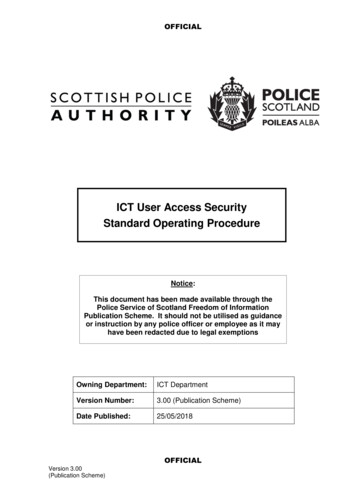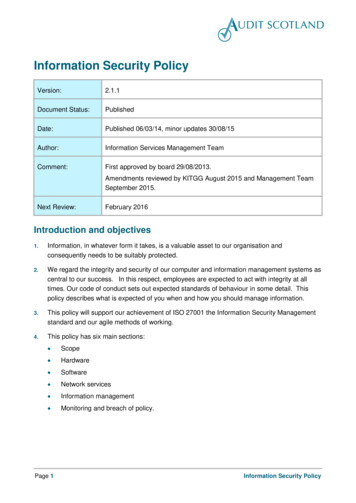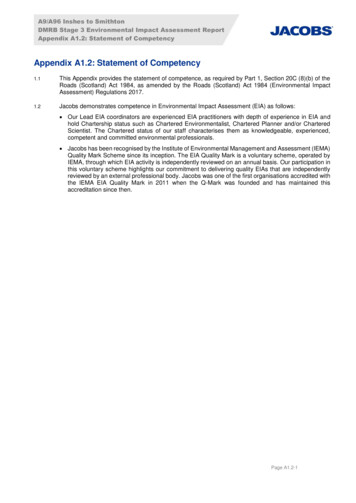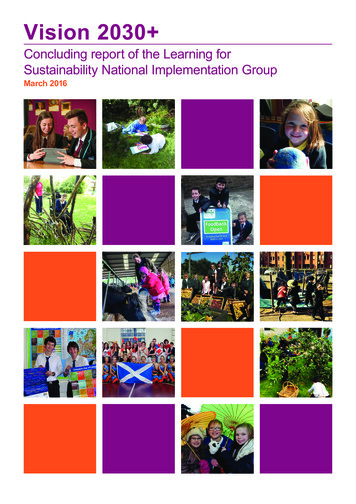
Transcription
HATCHETGARY PAULSEN"Plausible, taut, this survival story is a spellbinding account." —Kirkus (starred review)Thoughts of his parents' divorce fill Brian Robeson's head as he flies in a single-engine plane to visit hisfather in the Canadian wilderness. When the pilot suffers a massive heart attack and dies, Brian mustsomehow land the plane by himself and then, left with only the clothes he is wearing and a hatchet hereceived from his mother as a parting gift, Brian must put thoughts of his past behind him and try tofigure out how he can stay alive.''A heart-stopping story.something beyond adventure, a book that plunges readers into the cleft of theprotagonist's experience."—Publishers WeeklyA Newbery Honor BookAn ALA Notable BookBooklist Editor's Choice1.BRIAN ROBESON stared out the window of the small planeat the endless green northern wilderness below. It
was a small plane, a Cessna 406—a bush-plane—and the engine was so loud, so roaring andconsuming and loud, that it ruined any chance for conversation.Not that he had much to say. He was thirteen and the only passenger on the plane with a pilotnamed—what was it? Jim or Jake or something— who was in his mid-forties and who had been silentas he worked to prepare for take-off. In feet since Brian had come to the small airport in Hampton,New York to meet the plane—driven by his mother—the pilot had spoken only five words to him."Get in the copilot's seat." Which Brian had done. They had taken off and that was the last of theconversation. There had been the initial excitement, of course. He had never flown in a single-engineplane before and to be sitting in the copilot's seat with all the controls right there in front of him, allthe instruments in his face as the plane clawed for altitude, jerking and sliding on the wind currents asthe pilot took off, had been interesting and exciting. But in five minutes they had leveled off at sixthousand feet and headed northwest and from then on the pilot had been silent, staring out the front,and the drone of the engine had been all that was left. The drone and the sea of green trees that laybefore the plane's nose and flowed to the horizon, spread with lakes, swamps, and wanderingstreams and rivers.Now Brian sat, looking out the window with the roar thundering through his ears, and tried tocatalog what had led up to his taking this flight. The thinking started. Always it started with a singleword. Divorce.It was an ugly word, he thought. A tearing, ugly word that meant fights and yelling, lawyers—God,he thought, how he hated lawyers who sat with their comfortable smiles and tried to explain to him inlegal terms how all that he lived in was coming apart—and the breaking and shattering of all the solidthings. His home, his life—all the solid things. Divorce. A breaking word, an ugly breaking word.Divorce.Secrets.No, not secrets so much as just the Secret. What he knew and had not told anybody, what he knewabout his mother that had caused the divorce, what he knew, what he knew—the Secret.Divorce.The Secret.Brian felt his eyes beginning to bum and knew there would be tears. He had cried for a time, butthat was gone now. He didn't cry now. Instead his eyes burned and tears came, the seeping tears thatburned, but he didn't cry. He wiped his eyes with a finger and looked at the pilot out of the corner ofhis eye to make sure he hadn't noticed the burning and tears.The pilot sat large, his hands lightly on the wheel, feet on the rudder pedals. He seemed more a machine than a man, an extension of the plane. On the dashboard in front of him Brian saw dials, switches,meters, knobs, levers, cranks, lights, handles that were wiggling and flickering, all indicating nothingthat he understood and the pilot seemed the same way. Part of the plane, not human.When he saw Brian look at him, the pilot seemed to open up a bit and he smiled. "Ever fly in thecopilot's seat before?" He leaned over and lifted the headset off his right ear and put it on histemple, yelling to overcome the sound of the engine.Brian shook his head. He had never been in any kind of plane, never seen the cockpit of a planeexcept in films or on television. It was loud and confusing. "First time.""It's not as complicated as it looks. Good plane like this almost flies itself." The pilot shrugged."Makes my job easy." He took Brian's left arm. "Here, put your hands on the controls, your feet on
the rudder pedals, and I'll show you what I mean." Brian shook his head. "I'd better not." "Sure. Tryit."Brian reached out and took the wheel in a grip so tight his knuckles were white. He pushed his feetdown on the pedals. The plane slewed suddenly to the right."Not so hard. Take her light, take her light." Brian eased oft", relaxed his grip. The burning in his eyeswas forgotten momentarily as the vibration of the plane came through the wheel and the pedals. Itseemed almost alive."See?" The pilot let go of his wheel, raised his hands in the air and took his feet oft" the pedals toshow Brian he was actually flying the plane alone."Simple. Now turn the wheel a little to the right and push on the right rudder pedal a small amount."Brian turned the wheel slightly and the plane immediately banked to the right, and when hepressed on the right rudder pedal the nose slid across the horizon to the right. He left off on thepressure and straightened the wheel and the plane righted itself."Now you can turn. Bring her back to the left a little."Brian turned the wheel left, pushed on the left pedal, and the plane came back around. "It's easy."He smiled. "At least this part."The pilot nodded. "All of flying is easy. Just takes learning. Like everything else. Like everything else."He took the controls back, then reached up and rubbed his left shoulder. "Aches and pains—mustbe getting old."Brian let go of the controls and moved his feet away from the pedals as the pilot put his hands onthe wheel. "Thank you. . . "But the pilot had put his headset back on and the gratitude was lost in the engine noise and thingswent back to Brian looking out the window at the ocean of trees and lakes. The burning eyes did notcome back, but memories did, came flooding in. The words. Always the words.Divorce.The Secret.Fights.Split.The big split. Brian's father did not understand as Brian did, knew only that Brian's mother wantedto break the marriage apart. The split had come and then the divorce, all so fast, and the court had lefthim with his mother except for the summers and what the judge called "visitation rights." So formal.Brian hated judges as he hated lawyers. Judges that leaned over the bench and asked Brian if he understood where he was to live and why. Judges who did not know what had really happened. Judges withthe caring look that meant nothing as lawyers said legal phrases that meant nothing.In the summer Brian would live with his father. In the school year with his mother. That's what thejudge said after looking at papers on his desk and listening to the lawyers talk. Talk. Words.Now the plane lurched slightly to the right and Brian looked at the pilot. He was rubbing his shoulderagain and there was the sudden smell of body gas in the plane. Brian turned back to avoid embarrassing the pilot, who was obviously in some discomfort. Must have stomach troubles. So thissummer, this first summer when he was allowed to have "visitation rights" with his father, with thedivorce only one month old, Brian was heading north. His father was a mechanical engineer who haddesigned or invented a new drill bit for oil drilling, a self-cleaning, self-sharpening bit. He wasworking in the oil fields of Canada, up on the tree line where the tundra started and the forests ended.
Brian was riding up from New York with some drilling equipment—it was lashed down in the rear ofthe plane next to a fabric bag the pilot had called a survival pack, which had emergency supplies incase they had to make an emergency landing—that had to be specially made in the city, riding in abush plane with the pilot named Jim or Jake or something who had turned out to be an all right guy,letting him fly and all.Except for the smell. Now there was a constant odor, and Brian took another look at the pilot, foundhim rubbing the shoulder and down the arm now, die left arm, letting go more gas and wincing. Probably something he ate, Brian thought.His mother had driven him from the city to meet the plane at Hampton where it came to pick up thedrilling equipment. A drive in silence, a long drive in silence. Two and a half hours of sitting in thecar, staring out the window just as he was now staring out the window of the plane. Once, after anhour, when they were out of the city she turned to him."Look, can't we talk this over? Can't we talk this out? Can't you tell me what's bothering you?"And there were the words again. Divorce. Split. The Secret. How could he tell her what he knew?So he had remained silent, shook his head and continued to stare unseeing at the countryside, and hismother had gone back to driving only to speak to him one more time when they were close toHampton.She reached over the back of the seat and brought up a paper sack. "I got something for you, for thetrip."Brian took the sack and opened the top. Inside there was a hatchet, the kind with a steel handleand a rubber handgrip. The head was in a stout leather case that had a brass-riveted belt loop."It goes on your belt." His mother spoke now without looking at him. There were some farmtrucks on the road now and she had to weave through them and watch traffic. "The man at the storesaid you could use it. You know. In the woods with your father."Dad, he thought. Not "my father." My dad. "Thanks. It's really nice." But the words soundedhollow, even to Brian."Try it on. See how it looks on your belt."And he would normally have said no, would normally have said no that it looked too hokey to have ahatchet on your belt. Those were the normal things he would say. But her voice was thin, had asound like something thin that would break if you touched it, and he felt bad for not speaking to her.Knowing what he knew, even with the anger, the hot white hate of his anger at her, he still felt badfor not speaking to her, and so to humor her he loosened his belt and pulled the right side out andput the hatchet on and rethreaded the belt."Scootch around so I can see."He moved around in the seat, feeling only slightly ridiculous.She nodded. "Just like a scout. My little scout." And there was the tenderness in her voice that shehad when he was small, the tenderness that she had when he was small and sick, with a cold, and sheput her hand on his forehead, and the burning came into his eyes again and he had turned away fromher and looked out the window, forgotten the hatchet on his belt and so arrived at the plane with thehatchet still on his belt.Because it was a bush flight from a small airport there had been no security and the plane had beenwaiting, with the engine running when he arrived and he had grabbed his suitcase and pack bag andrun for the plane without stopping to remove the hatchet.
So it was still on his belt. At first he had been embarrassed but the pilot had said nothing aboutit and Brian forgot it as they took off and began flying.More smell now. Bad. Brian turned again to glance at the pilot, who had both hands on his stomachand was grimacing in pain, reaching for the left shoulder again as Brain watched."Don't know, kid." The pilot's words were a hiss, barely audible. "Bad aches here. Bad aches.Thought it was something I ate but. . . "He stopped as a fresh spasm of pain hit him. Even Brian could see how bad it was—the pain drove thepilot back into the seat, back and down."I've never had anything like this."The pilot reached for the switch on his mike cord, his hand coming up in a small arc from his stomach,and he flipped the switch and said, "This is flight four six."And now a jolt took him like a hammer blow, so forcefully that he seemed to crush back into theseat, and Brian reached for him, could not understand at first what it was, could not know.And then knew.Brian knew. The pilot's mouth went rigid, he swore and jerked a short series of slams into the seat,holding his shoulder now. Swore and hissed, "Chest! Oh God, my chest is coming apart!"Brian knew now.The pilot was having a heart attack. Brian had been in the shopping mall with his mother when aman in front of Paisley's store had suffered a heart attack. He had gone down and screamed about hischest. An old man. Much older than the pilot.Brian knew.The pilot was having a heart attack and even as the knowledge came to Brian he saw the pilot slaminto the seat one more time, one more awful time he slammed back into the seat and his right legjerked, pulling the plane to the side in a sudden twist and his head fell forward and spit came. Spitcame from the comers of his mouth and his legs contracted up, up into the seat, and his eyes rolledback in his head until there was only white.Only white for his eyes and the smell became worse, filled the cockpit, and all of it so fast, soincredibly fast that Brian's mind could not take it in at first. Could only see it in stages.The pilot had been talking, just a moment ago, complaining of the pain. He had been talking.Then the jolts had come.The jolts that took the pilot back had come, and now Brian sat and there was a strange feeling ofsilence in the thrumming roar of the engine—a strange feeling of silence and being alone. Brian wasstopped.He was stopped. Inside he was stopped. He could not think past what he saw, what he felt. All wasstopped. The very core of him, the very center of Brian Robeson was stopped and stricken with awhite-flash of horror, a terror so intense that his breathing, his thinking, and nearly his heart hadstopped.Stopped.Seconds passed, seconds that became all of his life, and he began to know what he was seeing,began to understand what he saw and that was worse, so much worse that he wanted to make hismind freeze again.He was sitting in a bushplane roaring seven thousand feet above the northern wilderness with a pilotwho had suffered a massive heart attack and who was either dead or in something close to a coma.
He was alone.In the roaring plane with no pilot he was alone.Alone.
2FOR A TIME that he could not understand Brian could donothing. Even after his mind began working andhe could see what had happened he could do nothing. It was as if his hands and arms were lead.Then he looked for ways for it not to have happened. Be asleep, his mind screamed at the pilot.Just be asleep and your eyes will open now and your hands will take the controls and your feet willmove to the pedals—but it did not happen.The pilot did not move except that his head rolled on a neck impossibly loose as the plane hit a smallbit of turbulence.The plane.Somehow the plane was still flying. Seconds had passed, nearly a minute, and the plane flew on as ifnothing had happened and he had to do something, had to do something but did not know what.Help.He had to help.He stretched one hand toward the pilot, saw that his fingers were trembling, and touched the piloton the chest. He did not know what to do. He knew there were procedures, that you could do mouthto-mouth on victims of heart attacks and push their chests—C.P.R.—but he did not know how to do itand in any case could not do it with the pilot, who was sitting up in the seat and still strapped in withhis seatbelt. So he touched the pilot with the tips of his fingers, touched him on the chest and couldfeel nothing, no heartbeat, no rise and fall of breathing. Which meant that the pilot was almost certainlydead."Please," Brian said. But did not know what or who to ask. "Please. . . "The plane lurched again, hit more turbulence, and Brian felt the nose drop. It did not dive, but thenose went down slightly and the down-angle increased the speed, and he knew that at this angle, thisslight angle down, he would ultimately fly into the trees. He could see them ahead on the horizonwhere before he could see only sky.He had to fly it somehow. Had to fly the plane. He had to help himself. The pilot was gone, beyondanything he could do. He had to try and fly the plane.He turned back in the seat, feeing the front, and put his hands—still trembling—on the controlwheel, his feet gently on the rudder pedals. You pulled back on the stick to raise the plane, he knewthat from reading. You always pulled back on the wheel. He gave it a tug and it slid back toward himeasily. Too easily. The plane, with the increased speed from the tilt down, swooped eagerly up anddrove Brian's stomach down. He pushed the wheel back in, went too far this time, and the plane's nosewent below the horizon and the engine speed increased with the shallow dive.Too much.He pulled back again, more gently this time, and the nose floated up again, too far but not as violentlyas before, then down a bit too much, and up again, very easily, and the front of the engine cowlingsettled. When he had it aimed at the horizon and it seemed to be steady, he held the wheel where itwas, let out his breath—which he had been holding all this time—and tried to think what to do next.It was a clear, blue-sky day with fluffy bits of clouds here and there and he looked out the windowfor a moment, hoping to see something, a town or village, but there was nothing. Just the green of thetrees, endless green, and lakes scattered more and more thickly as the plane flew—where?He was flying but did not know where, had no idea where he was going. He looked at the dashboard of the plane, studied the dials and hoped to get some help, hoped to find a compass, but it was
all so confusing, a jumble of numbers and lights. One lighted display in the top center of the dashboard said the number 342, another next to it said 22. Down beneath that were dials with lines thatseemed to indicate what the wings were doing, tipping or moving, and one dial with a needle pointing tothe number 70, which he thought—only thought—might be the altimeter. The device that told himhis height above the ground. Or above sea level. Somewhere he had read something about altimetersbut he couldn't remember what, or where, or anything about them.Slightly to the left and below the altimeter he saw a small rectangular panel with a lighted dial and twoknobs. His eyes had passed over it two or three times before he saw what was written in tiny letterson top of the panel. TRANSMITTER 221, was stamped in the metal and it hit him, finally, that this was theradio.The radio. Of course. He had to use the radio. When the pilot had—had been hit that way (hecouldn't bring himself to say that the pilot was dead, couldn't think it), he had been trying to use theradio.Brian looked to the pilot. The headset was still on his head, turned sideways a bit from his jammingback into the seat, and the microphone switch was clipped into his belt.Brian had to get the headset from the pilot. Had to reach over and get the headset from the pilot orhe would not be able to use the radio to call for help. He had to reach over.His hands began trembling again. He did not want to touch the pilot, did not want to reach for him.But he had to. Had to get the radio. He lifted his hands from the wheel, just slightly, and held themwaiting to see what would happen. The plane flew on normally, smoothly.All right, he thought. Now. Now to do this thing. He turned and reached for the headset, slid it fromthe pilot's head, one eye on the plane, waiting for it to dive. The headset came easily, but the microphone switch at the pilot's belt was jammed in and he had to pull to get it loose. When he pulled, hiselbow bumped the wheel and pushed it in and the plane started down in a shallow dive. Brian grabbedthe wheel and pulled it back, too hard again, and the plane went through another series of stomachwrenching swoops up and down before he could get it under control.When things had settled again he pulled at the mike cord once more and at last jerked the cordfree. It took him another second or two to place the headset on his own head and position the smallmicrophone tube in front of his mouth. He had seen the pilot use it, had seen him depress the switch athis belt, so Brian pushed the switch in and blew into the mike.He heard the sound of his breath in the headset. "Hello! Is there anybody listening on this? Hello."He repeated it two or three times and then waited but heard nothing except his own breathing.Panic came then. He had been afraid, had been stopped with the terror of what was happening, butnow panic came and he began to scream into the microphone, scream over and over."Help! Somebody help me! I'm in this plane and don't know. don't know. don't know."And he started crying with the screams, crying and slamming his hands against the wheel of theplane, causing it to jerk down, then back up. But again, he heard nothing but the sound of his ownsobs in die microphone, his own screams mocking him, coming back into his ears.The microphone. Awareness cut into him. He had used a CB radio in his uncle's pickup once. You had toturn the mike switch off to hear anybody else. He reached to his belt and released die switch.For a second all he heard was the whusssh of the empty air waves. Then, through the noise andstatic he heard a voice."Whoever is calling on this radio net, I repeat, release your mike switch—you are covering me.
You are covering me. Over."It stopped and Brian hit his mike switch. "I hear you! I hear you. This is me.!" He released theswitch."Roger. I have you now." The voice was very faint and breaking up. "Please state your difficulty andlocation. And say over to signal end of transmission. Over."Please state my difficulty, Brian thought. God. My difficulty. "I am in a plane with a pilot who is—whohas had a heart attack or something. He is—he can't fly. And I don't know how to fly. Help me. Help."He turned his mike off without ending transmission properly.There was a moment's hesitation before the answer. 'Tour signal is breaking up and I lost most of it.Understand. pilot. you can't fly. Correct? Over."Brian could barely hear him now, heard mostly noise and static. "That's right. I can't fly. The planeis flying now but I don't know how much longer. Over."". lost signal. Your location please. Flight number . location. ver.""I don't know my flight number or location. I don't know anything. I told you that, over."He waited now, waited but there was nothing. Once, for a second, he thought he heard a break inthe noise, some part of a word, but it could have been static. Two, three minutes, ten minutes, theplane roared and Brian listened but heard no one. Then he hit the switch again."I do not know the flight number. My name is Brian Robeson and we left Hampton, New Yorkheaded for the Canadian oil fields to visit my father and I do not know how to fly an airplane and thepilot."He let go of the mike. His voice was starting to rattle and he felt as if he might start screaming atany second. He took a deep breath. "If there is anybody listening who can help me fly a plane,please answer."Again he released the mike but heard nothing but the hissing of noise in the headset. After half anhour of listening and repeating the cry for help he tore the headset off in frustration and threw it tothe floor. II all seemed so hopeless. Even if he did get somebody, what could anybody do? Tell him tobe careful?All so hopeless.He tried to figure out the dials again. He thought he might know which was speed—it was alighted number that read 160—but he didn't know if that was actual miles an hour, or kilometers, Orif it just meant how fast the plane was moving through the air and not over the ground. He knewairspeed was different from groundspeed but not by how much.Parts of books he'd read about flying came to him. How wings worked, how the propeller pulled theplane through the sky. Simple things that wouldn't help him now.Nothing could help him now.An hour passed. He picked up the headset and tried again—it was, he knew, in the end all he had—but there was no answer. He felt like a prisoner, kept in a small cell that was hurtling through the skyat what he thought to be 160 miles an hour, headed—he didn't know where—just headed somewhereuntil.There it was. Until what? Until he ran out of fuel. When the plane ran out of fuel it would go down.Period.Or he could pull the throttle out and make it go down now. He had seen the pilot push the throttlein to increase speed. If he pulled the throttle back out, the engine would slow down and the
plane would go down.Those were his choices. He could wait for the plane to run out of gas and fall or he could pushthe throttle in and make it happen sooner. If he waited for the plane to run out of fuel he would gofarther—but he did not know which way he was moving. When the pilot had jerked he had movedthe plane, but Brian could not remember how much or if it had come back to its original course. Sincehe did not know the original course anyway and could only guess at which display might be thecompass—the one reading 342—he did not know where he had been or where he was going, so itdidn't make much difference if he went down now or waited.Everything in him rebelled against stopping the engine and falling now. He had a vague feeling thathe was wrong to keep heading as the plane was heading, a feeling that he might be going off in thewrong direction, but he could not bring himself to stop the engine and fall. Now he was safe, or saferthan if he went down—the plane was flying, he was still breathing. When the engine stopped he wouldgo down.So he left the plane running, holding altitude, and kept trying the radio. He worked out a system.Every ten minutes by the small clock built into the dashboard he tried the radio with a simplemessage: "I need help. Is there anybody listening to me?"In the times between transmissions he tried to prepare himself for what he knew was coming.When he ran out of fuel the plane would start down. He guessed that without the propeller pulling hewould have to push the nose down to keep the plane flying—he thought he may have read thatsomewhere, or it just came to him. Either way it made sense. He would have to push the nose downto keep flying speed and then, just before he hit, he would have to pull the nose back up to slow theplane as much as possible.It all made sense. Glide down, then slow the plane and hit.Hit.He would have to find a clearing as he went down. The problem with that was he hadn't seen one clearing since they'd started flying over the forest. Some swamps, but they had trees scattered through them.No roads, no trails, no clearings.Just the lakes, and it came to him that he would have to use a lake for landing. If he went down inthe trees he was certain to die. The trees would tear the plane to pieces as it went into them.He would have to come down in a lake. No. Onthe edge of a lake. He would have to come down near the edge of a lake and try to slow the plane asmuch as possible just before he hit the water.Easy to say, he thought, hard to do.Easy say, hard do. Easy say, hard do. It became a chant that beat with the engine. Easy say, hard do.Impossible to do.He repeated the radio call seventeen times at the ten-minute intervals, working on what he would dobetween transmissions. Once more he reached over to the pilot and touched him on the face, but theskin was cold, hard cold, death cold, and Brian turned back to the dashboard. He did what he could,tightened his seatbelt, positioned himself, rehearsed mentally again and again what his procedure shouldbe.When the plane ran out of gas he should hold the nose down and head for the nearest lake and tryto fly the plane kind of onto the water. That's how he thought of it. Kind of fly the plane onto thewater. And just before it hit he should pull back on the wheel and slow the plane down to reduce the
impact.Over and over his mind ran the picture of how it would go. The plane running out of gas, flying theplane onto the water, the crash—from pictures he'd seen on television. He tried to visualize it. Hetried to be ready.But between the seventeenth and eighteenth radio transmissions, without a warning, the enginecoughed, roared violently for a second and died. There was sudden silence, cut only by the sound ofthe wind milling propeller and the wind past the cockpit.Brian pushed the nose of the plane down and threw up.3GOING TO DIE, Brian thought. Going to die, gonna die,gonna die—his whole brain screamed it in thesudden silence.Gonna die.He wiped his mouth with the back of his arm and held the nose down. The plane went into a glide, avery fast glide that ate altitude, and suddenly there weren't any lakes. All he'd seen since they startedflying over the forest was lakes and now they were gone. Gone. Out in front, far away at the horizon,he could see lots of them, off to the right and left more of them, glittering blue in the late afternoonsun.But he needed one right in front. He desperately needed a lake right in front of the plane and all hesaw through the windshield were trees, green death trees. If he had to turn—if he had to turn hedidn't think he could keep the plane flying. His stomach tightened into a series of rolling knots andhis breath came in short bursts.There!Not quite in front but slightly to the right he saw a lake. L-shaped, with rounded corners, and theplane was nearly aimed at the long part of the L, coming from the bottom and heading to the top.Just a tiny bit to the right. He pushed the right rudder pedal gently and the nose moved over.But the turn cost him speed and now the lake was above the nose. He pulled back on the wheelslightly and the nose came up. This caused the plane to slow dramatically and almost seem to stop andwallow in the air. The controls became very loose-feeling and frightened Brian, making him
The Secret. Fights. Split. The big split. Brian's father did not understand as Brian did, knew only that Brian's mother wanted to break the marriage apart. The split had come and then the divorce, all so fast, and the court had left him with his mother except for the summers
